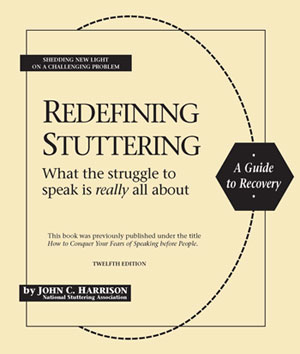Stuttering
Answers
all your speech dysfluency
questions answered
on one site
What is Stuttering?Without going into a technical definition of stuttering that you may find on similar websites devoted to stuttering it is safe to say that most people have a general understanding of what stuttering is and would demonstrate it by: 1) repeating sounds or syllables during speech 2) abnormally extending sounds or syllables during speech 3) blocking on a sound during speech One is likely to demonstrate some level of struggling behaviour but all individual understandings of what stuttering is would depend on what that person had seen or heard when they have come in contact with a person with a stutter. All this is a description of stuttering described from the listener’s perspective however the experience of stuttering can be much more when described from the speakers perspective. Although stuttering has been known to commence in adult years under unusual circumstances it generally has its origins in childhood. At the age of 2 – 5 years old young children are learning to join words together into meaningful sentences and it is at this time that the early symptoms of stuttering can commence. It is in fact not unusual for 5% of children to demonstrate stuttering behaviour however most (80%) of these children will recover from these symptoms within a couple of years and certainly by the age of 12. While unassisted recovery from the symptoms of stuttering is common about 1% of children are likely to carry their dysfluent speech into adulthood unless some early intervention is undertaken. While the prevalence of stuttering in society is about 1% it is a disposition that affects 4 times as many boys as it does girls. The observable physical manifestation of stuttering varies from person to person from mild and infrequent repetitions, prolongations and cessations of sound or blocks to what would best be described as severe and regular occurrences of these symptoms to the point where in some situation the individual is unable to speak. The observable manifestation of stuttering as seen from the listeners perspective is only one aspect of the disorder. Some people who would self diagnose themselves as having a stutter are able to hide much of the physical side of stuttering buy avoiding words that they believe they are going to stutter on. They either say a similar word or do not say that word at all or circle around the word in some way until they feel that they can say it fluently. People with this form a mild physical stuttering have what is colloquially termed “covert stuttering”. Many covert stutterers have difficulty introducing themselves to other people, answering the telephone and other situations that the average person also find a little difficult like making a speech in front of a group of people. In fact the closest that a person will have to experiencing the specking anxiety that a person who stutterers can often feel is when an if they have to make a public speech themselves. While the physical symptoms of stuttering are many and varied there is another unseen symptom that can be as variable as the physical and observable symptoms. The other side of stuttering that is little understood by anyone who has not experienced this dysfluency disorder is the psychological side. Speech is one of the primary ways that a person expresses their inner feelings and desires so if the effective and timely production of speech is impaired in some way it can have variable effects of the afflicted individual that can range from as little as indifference and annoyance to severe embarrassment and varying levels of social phobia, general fear of speaking and depression. In the main, people who have a stutter tend to have a higher that average level of intelligence, drive and ambition and in general, thankfully, most people who live with both the physical and psychological symptoms of stuttering cope relatively well with what life has thrown at them tend to live fruitful and well adjusted lives. Famous people who have battled with stuttering to some degree have been: Sir Winston Churchill, King George V1, Marilyn Munroe, Lewis Carroll, Charles Darwin, Carly Simon, James Earl Jones, Tiger Woods, Bruce Willis, Prince Albert of Monaco, and US Vice President Joe Biden
|
Stuttering Facts
Stuttering Advice
Stuttering Treatment Centres
Stuttering Treatments
Useful Articles Books, Audio & Video
Videos About Stuttering
Stuttering Support Groups
Stuttering News Articles
Stuttering Research
Discussion Forums
Conferences & Events
|
Copyright (c) 2011 - All Right Reserved - Stuttering Answers

